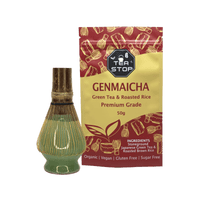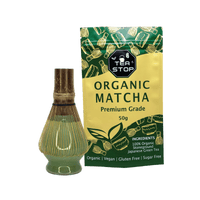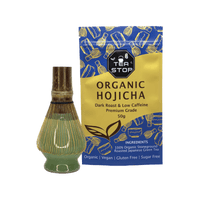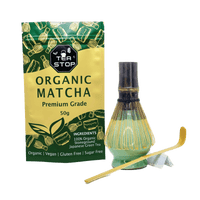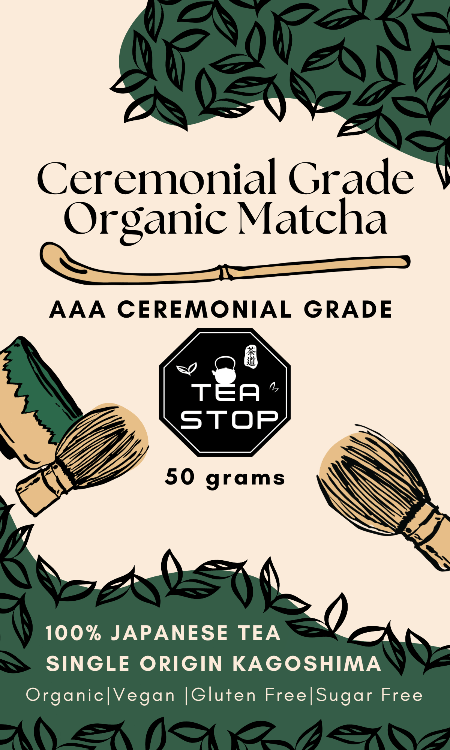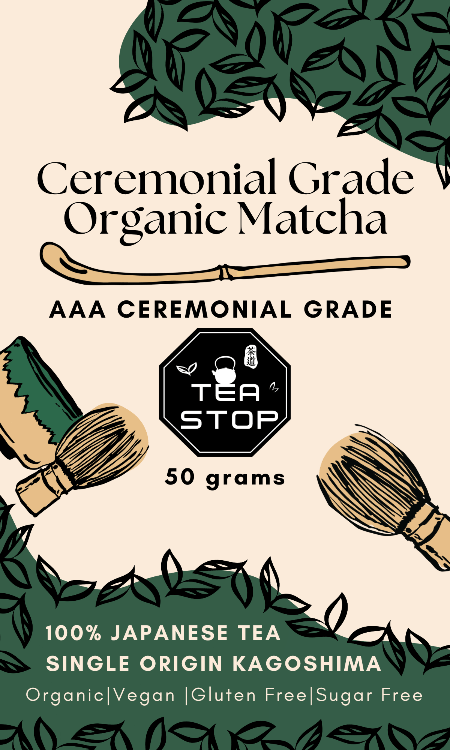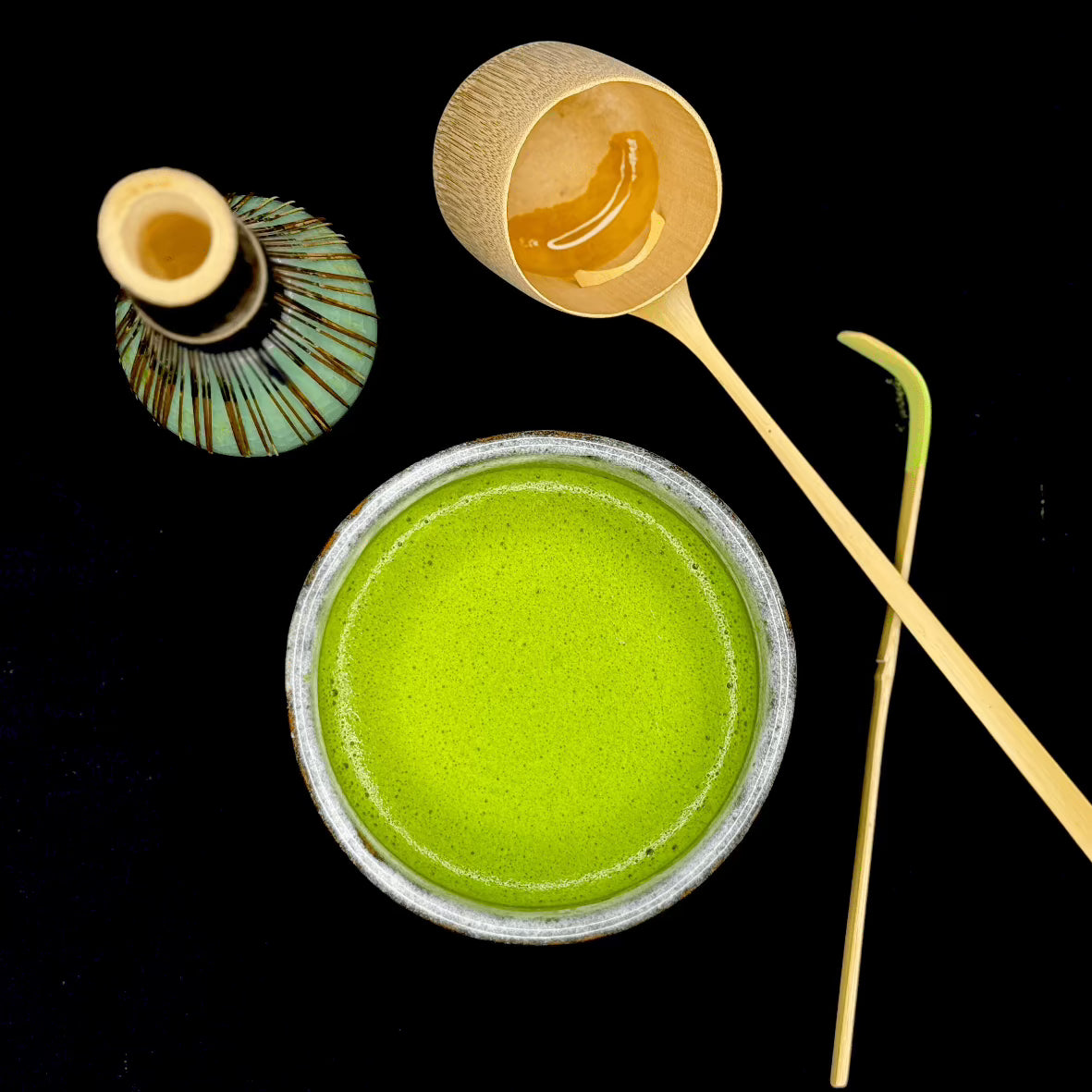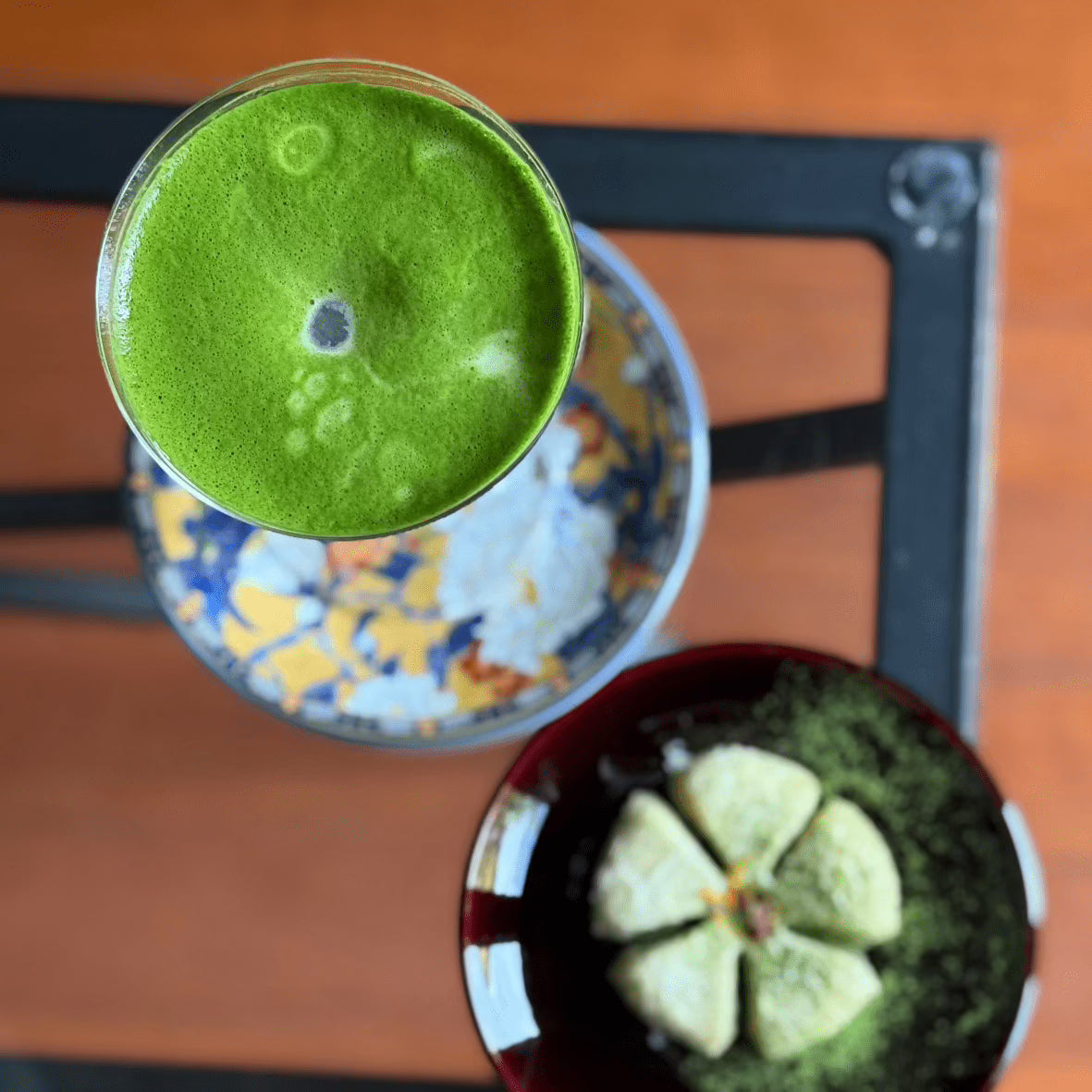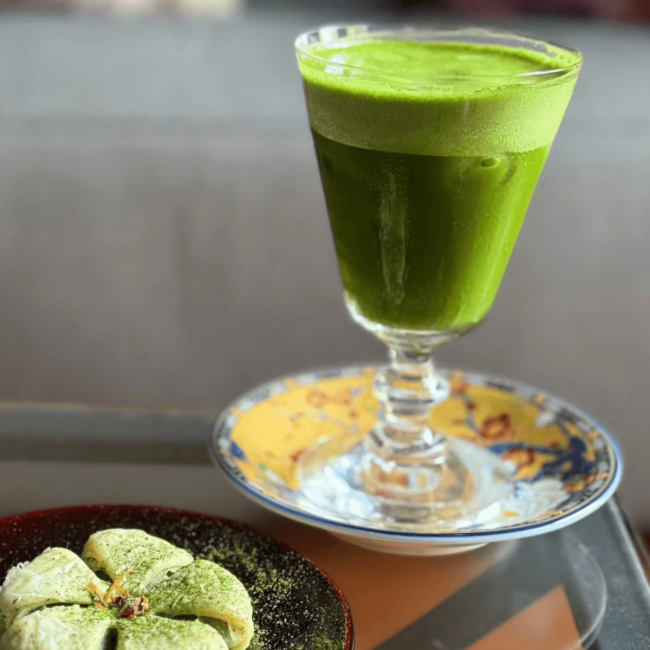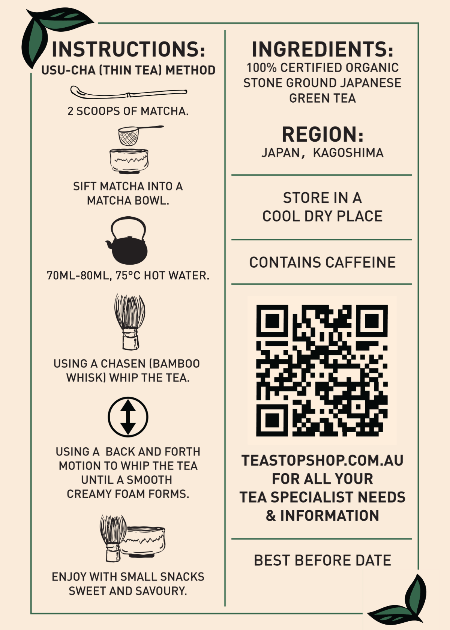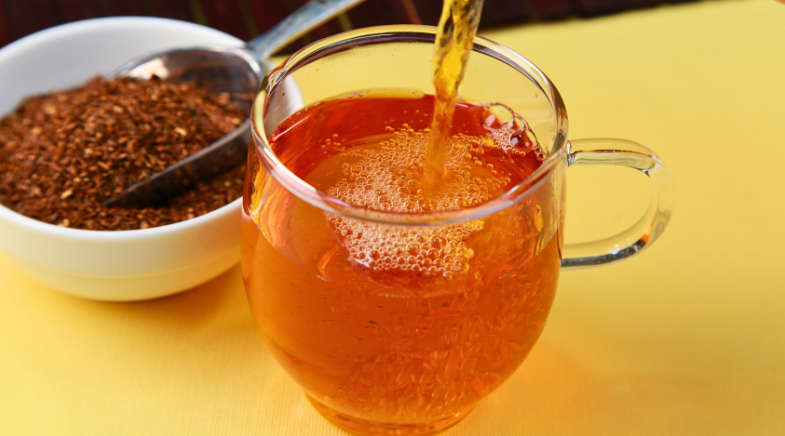
Rooibos Tea for Skin: The Ultimate Guide to Its Benefits
Share
Rooibos tea, an herbal infusion derived from the Aspalathus linearis plant native to South Africa's Western Cape, has gained popularity worldwide, especially among wellness enthusiasts in Australia. This naturally caffeine-free beverage is now being explored for its potential benefits in natural skincare solutions.
The growing interest in rooibos tea for skin is part of a larger trend towards plant-based wellness practices. Australians are not only enjoying rooibos as a calming daily ritual but also incorporating it into their skincare routines. With its ability to reduce inflammation and promote healthy skin, rooibos serves as a holistic approach to both internal well-being and external beauty.
This guide explores how rooibos tea benefits your skin, both through drinking and topical application. You’ll learn about its skin-friendly compounds, how to integrate it into your daily life, and why so many Australians now include Organic Rooibos Tea in Australia as part of their beauty and wellness regimen.
Understanding Rooibos Tea
Aspalathus linearis grows only in the Cederberg region of South Africa's Western Cape. Here, the combination of sandy soil, specific climate conditions, and altitude creates the perfect environment for this remarkable plant. This shrub with needle-like leaves belongs to the legume family and produces small yellow flowers before harvest. Unlike traditional tea made from the Camellia sinensis plant, rooibos is naturally caffeine-free and contains no tannins that can interfere with mineral absorption.
The Difference Between Red and Green Rooibos
The way rooibos is processed determines whether you're drinking red rooibos or green rooibos:
- Red rooibos: This type undergoes oxidation through bruising and fermenting the leaves, which gives it its distinctive amber colour and sweet, earthy flavour.
- Green rooibos: In contrast, green rooibos skips this oxidation step. Instead, it preserves more of the plant's natural compounds by immediately steaming and drying the leaves. As a result, this unoxidized variety maintains a lighter colour and grassier taste while retaining higher levels of certain beneficial compounds.
Both varieties offer strong Rooibos Tea Benefits, but green rooibos is often chosen for its higher antioxidant levels—perfect for skincare and digestive wellness enthusiasts alike.
Nutritional Benefits of Rooibos
Both red and green rooibos offer impressive herbal tea antioxidants, although their profiles differ slightly. The nutrient composition includes:
- Aspalathin and nothofagin: These are unique flavonoids found only in rooibos with powerful antioxidant properties.
- Zinc: This mineral supports collagen production and aids in wound healing.
- Calcium and magnesium: Essential minerals for skin cell regeneration.
- Iron: Promotes healthy circulation to skin tissues.
- Alpha hydroxy acids: Natural compounds that support skin renewal.
- Quercetin and luteolin: Anti-inflammatory polyphenols.
This rich nutritional foundation explains why rooibos has become a sought-after ingredient in both internal wellness practices and topical skincare formulations.
The Skin-Loving Components of Rooibos Tea
The amazing benefits of rooibos tea for the skin come from its powerful combination of protective substances. The key to its effectiveness lies in the antioxidants found in rooibos, which tirelessly fight against free radicals—unstable molecules that speed up skin aging, break down collagen, and cause visible damage such as fine lines and uneven tone. By targeting these harmful molecules before they can harm skin cells, rooibos acts as a shield against environmental stressors.

Antioxidants: The Skin's Defence Against Aging
Antioxidants are essential for maintaining youthful-looking skin. They work by neutralising free radicals, preventing them from causing oxidative stress and damage to skin cells. Rooibos tea is packed with antioxidants, making it an excellent choice for protecting your skin from the signs of aging.
Polyphenols: The Unique Compounds in Rooibos
Rooibos tea contains unique polyphenols, notably aspalathin, exclusive to it. Aspalathin is a potent antioxidant that combats oxidative stress and supports skin healing for a clear, balanced complexion. Together with other polyphenols, it forms a strong defence protecting skin from external aggressors.
Minerals: The Building Blocks of Healthy Skin
In addition to antioxidants and polyphenols, rooibos tea also contains essential minerals that contribute to skin health:
- Zinc: Supports wound healing and regulates oil production
- Calcium: Strengthens the skin barrier and aids in cell renewal
- Magnesium: Calms inflammation and supports moisture retention
- Iron: Promotes healthy circulation, delivering oxygen and nutrients to skin cells
- Vitamin C: Brightens skin tone while supporting collagen synthesis
These minerals work together with the other components in rooibos to nourish your skin from within. By providing the necessary nutrients for optimal skin function, rooibos tea helps maintain a healthy and radiant complexion.
How Rooibos Tea Supports Skin Health
The benefits of Rooibos Tea for Skin go beyond just its nutrients. When used on the skin or consumed regularly, this plant from South Africa has specific effects that target common skin issues directly.
1. Fighting Free Radical Damage
Rooibos antioxidants neutralise free radicals from UV, pollution, and stress, preventing collagen and elastin breakdown. By blocking damage to cellular DNA, rooibos supports skin's natural repair.
2. Reducing Inflammation on the Surface
Rooibos' anti-inflammatory effects stem from its unique flavonoids, especially quercetin and luteolin, which block pathways causing redness, swelling, and discomfort. This calming property gently relieves eczema and acne inflammation without harsh chemicals.
3. Mild Exfoliation with Natural Acids
Alpha hydroxy acids (AHAs) in rooibos, though in small amounts, help shed old skin cells by gently dissolving their bonds, revealing fresher layers. This gentle exfoliation improves texture and radiance, suits sensitive skin, and supports rooibos's anti-aging properties for a smooth, even tone without harsh treatments.
Harnessing the Power of Rooibos Tea for Specific Skin Concerns
Rooibos Tea for Eczema Relief
Rooibos tea's anti-inflammatory compounds effectively manage eczema by calming the immune response that triggers flare-ups. Quercetin and luteolin reduce redness, itching, and inflammation. Many find regular use extends flare-up intervals and lessens their severity.
Natural Acne Support Through Rooibos
Acne-prone skin benefits from rooibos tea's antibacterial and anti-inflammatory properties. Zinc regulates sebum, while natural compounds reduce inflammation and redness. Unlike harsh chemicals, rooibos gently heals without stripping the skin's barrier, balancing pH to deter acne-causing bacteria.
Soothing Sensitive and Irritated Skin
Rooibos tea, naturally caffeine-free, is a gentle ally for reactive or sensitive skin. Its minerals nourish delicate skin, while antioxidants protect without irritation. Ideal for environmental stress, seasonal changes, or sensitivity, rooibos calms and restores balance.
Topical Application of Rooibos Tea: Unlocking Its Skincare Potential
Bringing rooibos tea directly to your skin opens up a world of gentle, nourishing care. The antioxidants and minerals that make this South African herb so beneficial internally work just as beautifully when applied externally.

Direct Application Methods
Brewed rooibos tea serves as an excellent base for various topical treatments:
- Facial toner: Brew a strong cup of rooibos, allow it to cool completely, then apply with a cotton pad after cleansing
- Compress: Soak a clean cloth in warm rooibos tea and place it over irritated areas for 10-15 minutes
- Bath soak: Add several cups of strongly brewed rooibos to bathwater for full-body skin nourishment
Simple DIY Rooibos Skincare Recipes
Creating your own rooibos face masks at home requires minimal ingredients. Mix cooled, concentrated rooibos tea with raw honey and a tablespoon of oat flour for a calming mask that addresses redness and dryness. For oily or combination skin, blend brewed rooibos with bentonite clay and a few drops of tea tree oil.
A refreshing rooibos mist combines chilled tea with aloe vera gel in a spray bottle, perfect for midday hydration or post-cleansing care.
Synergistic Benefits: Inside and Out
Combining daily drinking with topical use allows rooibos’ antioxidants to work in harmony. For best results, learn How to Brew Rooibos Tea properly using freshly boiled water and steeping for 5–7 minutes to release its full potential.
You can also enjoy a cup before bedtime, as Rooibos Tea for Sleep helps you unwind, reduces cortisol levels, and supports overnight skin repair.
The Growing Popularity of Rooibos Tea for Skin Benefits in Australia
Rooibos tea has become a popular choice among Australia's wellness community, known for its natural skincare benefits. You can find this beverage in health food stores, specialty tea shops, and even regular supermarkets across the country. What was once a niche product is now widely available, reflecting a larger trend towards plant-based wellness solutions. For a delicious way to enjoy these benefits, try a cup of Organic Rooibos Chai, a flavorful blend that combines the skin-loving properties of rooibos with aromatic spices, perfect for your daily wellness ritual.
Why Australians Are Drinking Rooibos Tea
For health-conscious Australians, drinking rooibos tea goes beyond just staying hydrated. Many have made this caffeine-free brew a part of their daily routines because they understand that regular consumption can deliver antioxidants directly to their skin cells through the bloodstream. This approach aligns perfectly with the belief that true skin health starts from within.
Rooibos Tea's Role in Australia's Natural Skincare Trends
Rooibos tea has emerged as a key ingredient in Australia's beauty scene, thanks to the rise of natural skincare trends. Local brands are increasingly incorporating rooibos extracts into their products, while consumers are brewing their own cups as part of their morning and evening skincare rituals. This two-pronged strategy—drinking and applying—offers a holistic approach to nourishing the skin.
The Availability of Rooibos Products in Australia
The Australian market now offers various rooibos options:
- Organic loose-leaf varieties sourced from South African farms
- Convenient tea bags for daily consumption
- Rooibos-infused skincare products from local Australian brands
- Specialty blends combining rooibos with other skin-supporting botanicals
This widespread availability makes it easy and affordable for Australian consumers to incorporate rooibos tea into their daily lives as they seek genuine, plant-based skincare solutions.
Is Rooibos Tea Safe for All Skin Types?
Rooibos tea is one of the gentle skincare ingredients with a very low risk of causing problems. Whether you drink it every day or put it directly on your skin, this plant from South Africa has shown very few negative reactions in different groups of people. Doctors and users have consistently reported no major issues with rooibos tea side effects, skin problems, making it a great choice for those looking for natural ways to improve their skin health.
Why Rooibos Tea is Safe for Your Skin
Here are some reasons why rooibos tea is safe for all skin types:
- No Caffeine Irritants: Rooibos tea doesn't contain caffeine like other teas, which can sometimes irritate the skin.
- pH Balance Compatibility: The pH level of rooibos tea is similar to that of healthy skin, so applying it topically won't disturb your skin's protective barrier.
- Suitable for Reactive Skin: People with reactive or sensitive skin conditions can also use rooibos tea without any issues.
Benefits for Sensitive Skin Types
Rooibos tea is particularly beneficial for individuals with sensitive skin:
- No harsh tannins means less chance of drying or irritating the skin
- Natural anti-inflammatory compounds work without causing sensitivity
- Hypoallergenic properties make allergic reactions extremely rare
- Organic compounds in the plant support delicate skin barriers instead of challenging them
Patch Testing: A Smart Practice
Even though reactions to rooibos are uncommon based on documented cases, it's still a good idea to do patch testing when introducing any new topical ingredient into your routine. This will help ensure that you don't have any unexpected adverse reactions.
In summary:
This guide to rooibos tea skin benefits reveals how this South African plant treasure offers a gentle yet powerful way to care for your skin. From its rich antioxidants to its soothing anti-inflammatory properties, rooibos tea for skin provides a natural solution for issues like eczema, acne, and premature aging.
The beauty of rooibos lies in its versatility—whether you're sipping a warm cup to boost your internal antioxidants or applying it topically through homemade toners and masks, you're using centuries of plant knowledge. Its caffeine-free nature and minimal side effects make it an easy addition to any skincare routine, no matter your skin type.
Consider starting with a simple daily practice: brew a cup of quality rooibos tea each morning, and save some of the cooled tea for a refreshing facial spray. This two-pronged approach lets you enjoy both the internal nourishment and external calming benefits that make rooibos such a beloved ingredient in mindful skincare routines.
FAQs (Frequently Asked Questions)
What are the key skin benefits of rooibos tea?
Rooibos tea offers multiple skin benefits, including fighting free radical damage with its antioxidants, reducing inflammation, providing mild exfoliation through natural alpha hydroxy acids (AHAs), and supplying essential minerals that support healthy skin.
How does rooibos tea help with specific skin concerns like eczema and acne?
Rooibos tea contains anti-inflammatory compounds that can soothe eczema and reduce redness. Its unique combination of antioxidants and polyphenols also supports acne-prone skin by calming irritation and promoting clearer skin.
Can rooibos tea be used topically for skincare?
Yes, brewed rooibos tea can be applied directly to the skin as a base for various treatments. It can be incorporated into DIY face masks and skincare recipes to harness its soothing and antioxidant properties for improved skin health.
Is rooibos tea safe for all skin types, including sensitive skin?
Rooibos tea is considered gentle and safe for all skin types. It is especially beneficial for sensitive or reactive skin due to its soothing effects. However, patch testing is recommended to rule out any rare allergic reactions.
What makes rooibos tea popular in Australia’s natural skincare trends?
In Australia, rooibos tea has gained popularity because it aligns with the growing demand for natural, antioxidant-rich skincare ingredients. Its availability in organic products and versatility for both drinking and topical use contribute to its rising trend.
What is the difference between red and green rooibos tea regarding skin benefits?
The processing method distinguishes red from green rooibos. While both offer impressive antioxidants beneficial for the skin, green rooibos retains higher levels of certain polyphenols due to minimal oxidation, potentially enhancing its anti-aging and anti-inflammatory effects.

